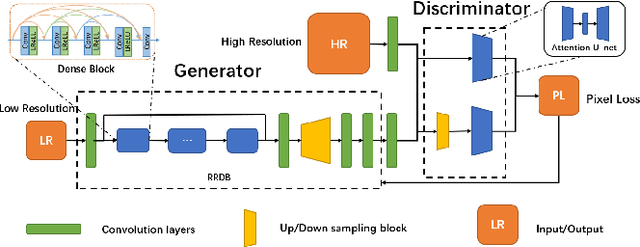A-ESRGAN: Training Real-World Blind Super-Resolution with Attention U-Net Discriminators
Paper and Code
Dec 19, 2021



Blind image super-resolution(SR) is a long-standing task in CV that aims to restore low-resolution images suffering from unknown and complex distortions. Recent work has largely focused on adopting more complicated degradation models to emulate real-world degradations. The resulting models have made breakthroughs in perceptual loss and yield perceptually convincing results. However, the limitation brought by current generative adversarial network structures is still significant: treating pixels equally leads to the ignorance of the image's structural features, and results in performance drawbacks such as twisted lines and background over-sharpening or blurring. In this paper, we present A-ESRGAN, a GAN model for blind SR tasks featuring an attention U-Net based, multi-scale discriminator that can be seamlessly integrated with other generators. To our knowledge, this is the first work to introduce attention U-Net structure as the discriminator of GAN to solve blind SR problems. And the paper also gives an interpretation for the mechanism behind multi-scale attention U-Net that brings performance breakthrough to the model. Through comparison experiments with prior works, our model presents state-of-the-art level performance on the non-reference natural image quality evaluator metric. And our ablation studies have shown that with our discriminator, the RRDB based generator can leverage the structural features of an image in multiple scales, and consequently yields more perceptually realistic high-resolution images compared to prior works.
 Add to Chrome
Add to Chrome Add to Firefox
Add to Firefox Add to Edge
Add to Edge